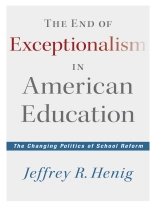Over the past fifty years, the “special status” of education decision-making has been eroded. Once the province of local and state school boards, decisions about schools and schooling have begun to emerge in every level and branch of government. In
The End of Exceptionalism in American Education, Jeffrey R. Henig traces the roots of this tectonic shift in school governance.
Carefully reasoned, astutely observed, and thoughtfully presented, this volume promises to become a classic work in our understanding of education policy—and an invaluable resource for those seeking to influence its future trajectory.
Tentang Penulis
Jeffrey R. Henig is a professor of political science and education and chair of the Department of Education Policy and Social Analysis at Teachers College, Columbia University. He is also a professor of political science at Columbia University.
He is the author or coauthor of ten books, including
The Color of School Reform: Race, Politics, and the Challenge of Urban Education (Princeton University Press, 1999) and
Building Civic Capacity: The Politics of Reforming Urban Schools (University Press of Kansas, 2001), both of which were named—in 1999 and 2001, respectively—the best book written on urban politics by the Urban Politics Section of the American Political Science Association.
Spin Cycle: How Research Is Used in Policy Debates: The Case of Charter Schools (Russell Sage Foundation, 2008) won the American Educational Research Association’s (AERA) Outstanding Book Award, 2010. Most recently, Henig coedited and contributed to
Between Public and Private: Politics, Governance, and the
New Portfolio Models for Urban School Reform (Harvard Education Press, 2010), winner of the Districts in Research and Reform SIG Best Book Award, 2012.












